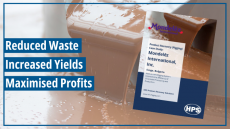Bisphenol A-free chocolate moulds enter the market
BPA is a chemical used in certain food packaging materials, notably polycarbonates for baby bottles, and has grabbed the headlines recently with the debate centred on the potential effect, and exposure, of this chemical compound on infants and children.
Hans Brunner, that supplies a variety of moulds for industrial chocolate makers and SME's, set about designing a mould from a BPA-free material about a year ago to accompany and compliment their portfolio of moulds made from synthetic materials, mainly polycarbonate.
"We've been following the BPA discussions for several years, particularly those in the US and Japan, and about a year ago started to look for a material that would be BPA-free," a spokesperson at the Bavarian-based company told ConfectioneryNews.com.
A fitting alternative needed to possess the same key properties as current chocolate moulds. According to the spokesperson these include: strong heat and chemical resistance; the material must not break in the process; and should not deshape.
As every new material has some small disadvantages and lacks the plastic industry's long experience with polycarbonates, privately-owned Hans Brunner has kicked off with small moulds in the range of 275 mm by 175 mm for the BPA-free material, and will ultimately build up to larger moulds.
The material they selected remains "top secret", said the spokesperson, but added that it is FDA approved.
The BPA debate
With this latest roll-out, Hans Brunner is arguably ahead of the curve. Visibility regarding demand from confectioners for this type of product in Europe is as yet unclear, but the debate is gaining momentum. And in North America, the dialogue has accelerated.
Sister publication FoodProductionDaily.com reported this week that the US Food and Drug Administration (FDA) is due to provide more information to the public later this month about its safety review of Bisphenol A.
A spokesperson for the Food and Drug Administration (FDA) told FoodProductionDaily.com that it will update its science board in a public meeting on 24 February regarding its continued assessment of BPA in FDA-regulated products, including food contact applications.
The update follows-on from rumbles last year when the agency claimed the packaging chemical was safe at current levels in consumer products.
Their assessment was criticised for using industry-funded reports to support their assessment. The scientific community argued that the FDA review should also have included independent studies that have raised uncertainties regarding the potential effects of low dose exposure to BPA in humans, notably babies and infants.
In December 2008, the agency said it would undertake further research on BPA, which would include consideration of some of those studies.
And in Europe, the European Food Safety Authority (EFSA) said in November last year that it would not be revising its position on bisphenol A, following criticism of the FDA's draft assessment.
Following an assessment of BPA by its scientific panel on Food Additives, Flavourings, Processing Aids and Materials in Contact with Food (AFC) EFSA concluded in July 2008 that the Tolerable Daily Intake (TDI) of 0.05 milligram/kg body weight per day it had set following its previous BPA assessment remained valid.
The risk assessor claimed the TDI provides a sufficient margin of safety for the protection of the consumer, including foetuses and newborns.








